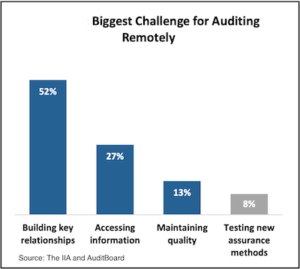
A new report finds that internal auditors are still largely working from home, and with the rise of the Omicron variant it looks like remote internal auditing will likely last well into 2022. The study, conducted by the Institute of Internal Auditors’ Internal Audit Foundation and audit technology provider AuditBoard, also found that hybrid work models are likely to outlive the pandemic.
“The hybrid work experiment of 2020 and 2021 has been normalized,” the report’s authors wrote. “Home offices have been set up, employees have proven their ability to be productive away from the office, and both employees and employers have seen the value of shorter commute times, a smaller office footprint, and a wider potential talent pool.”
According to the report, titled “The Remote Auditor: Challenges, Opportunities, and New Ways of Working,” 58 percent of chief audit executives (CAEs) indicated their teams were doing all or most of their work remotely and a further 22 percent said their teams were taking a hybrid approach of roughly equal remote and in-person work. Just 18 percent of the more than 500 respondents surveyed in October and November of 2021 report that all or most of their work is being done in person.
Challenges of Remote Auditing
While the shift to remote work models for internal audit have been largely successful, remote auditing does have some difficulties to overcome. According to the survey, 52 percent of  respondents say the biggest challenge to conducting internal audit work remotely is building key relationships in the organization. More than a quarter of respondents (27 percent) said accessing information was the biggest hurdle. Other concerns captured by the survey are maintaining quality (13 percent) and testing new assurance methods (8 percent.) The concern about building relationships when working remotely is further underscored by a separate finding from a survey conducted by AuditBoard in September—40 percent of internal auditors said relationships with non-audit personnel in the organization had weakened as a result of remote auditing.
respondents say the biggest challenge to conducting internal audit work remotely is building key relationships in the organization. More than a quarter of respondents (27 percent) said accessing information was the biggest hurdle. Other concerns captured by the survey are maintaining quality (13 percent) and testing new assurance methods (8 percent.) The concern about building relationships when working remotely is further underscored by a separate finding from a survey conducted by AuditBoard in September—40 percent of internal auditors said relationships with non-audit personnel in the organization had weakened as a result of remote auditing.
“People are having to make a much more conscious decision to do reach-outs, to schedule time, or even to text someone a simple ‘hey, do you have a couple of minutes?’” said Harold Silverman, director of executive membership at the IIA.
Finding Technology Solutions
Another finding of the report is that the shift to remote internal audit work has spurred an increase in the adoption of new technologies to overcome some of the challenges noted above. Indeed, more than half of respondents (51 percent) said that since the start of the pandemic their organizations have acquired cloud-based technology to help with remote collaboration and risk management.
In addition to cloud-based technology like audit management platforms, business intelligence applications, and data analytics tools, audit teams have made use of video conferencing applications for audit work and walkthroughs, existing security camera networks to replace activities requiring physical observation, and even drones for certain kinds of site inspections.
“As fully remote and hybrid work models continue to become more common, an increasing number of audit teams are discovering that modern audit technology can help them better collaborate on their work, more rapidly surface risks, and drastically improve alignment and communication with business stakeholders,” explained John Reese, chief marketing officer at AuditBoard. “In today’s broad and dynamic risk environment it’s imperative for internal audit departments to move in this direction.”
Developing Team Culture
Another difficulty to address with internal audit team members working remotely during the pandemic is developing and maintaining a positive culture, the report emphasized. According to the study, issues include high turnover, difficulty “on-boarding” new hires, and fostering good relationships among team members. “The traditional ways of getting to know people—lunches, happy hours, and regular in-person meetings—are curtailed or impractical, especially if new employees are geographically remote,” the report’s authors write.
The study finds that companies are experimenting with different solutions to support culture such as hosting Zoom happy hours or trivia nights, extending early release days, shortening the work week once a month, or giving extra holiday time off. Other organizations have staff participate in socially distanced games and also have delivered food to employees at their homes during the pandemic.
“By default, I think the nature of the work was always relatively easy to do remotely. We weren’t used to it, but it translated easily,” said Richard Lee, senior director and head of internal audit at Snapchat.
By now it’s clear to many organizations that a big return to corporate offices is still a long way off for many internal audit team members. Rather than hurry that return, most organizations are becoming more comfortable with the idea of internal auditors working remotely and are working to overcome the remaining challenges. Even when the pandemic is over—fingers crossed—work-from-home models and hybrid arrangements are likely to stick around. ![]()
Joseph McCafferty is editor & publisher at Internal Audit 360°.


